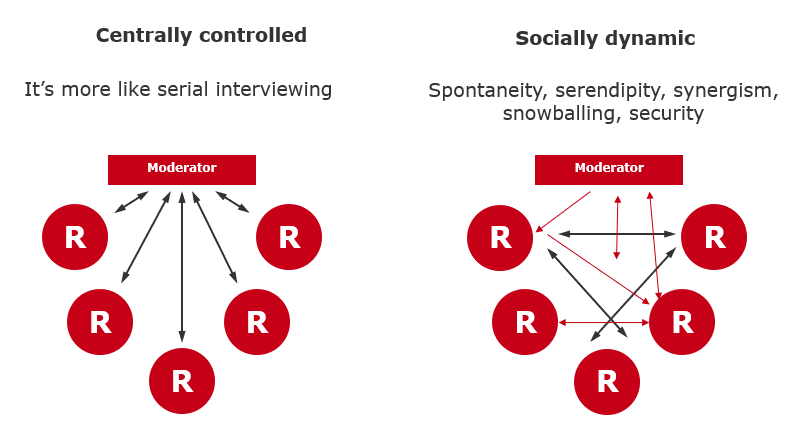Interviewing or moderating is about more than asking questions.
The demo of a bad interview shows you the importance of listening, being fully present, eye contact, not offering your own views or assumptions, staying open with your questions and following up.
So its not just what you ask, its how you are, and how much empathy you have with your respondent/s.
Notice you need all of these skills for moderating focus groups as well, whether you are working online or face to face.
Very grateful to I-TECH for permission to use this interview. The full transcript, with all the mistakes, can be seen here
Although we spend our lives talking with other people, there are some habits we need to unlearn. Focusing outward on the respondent (not inward on your own thinking) will help you avoid these traps.
Demonstration of how it should be done.
The interviewer is not distracted by her notes or her phone. She uses open questions, follows up on what was important to the respondent, and sees the topics from the respondent’s point of view. She gets much more useful information as a result.
Check if you more naturally use open, or closed questions.
You are going to do a warm up about hybrid working (part office, part working from home.) Which list of questions seems to you to be best?
LIST A
- Do you think its a good idea to have some days in the office?
- Is it better to allow people to choose or should members of the same team all come in on the same days?
- Do you worry about managers thinking you are productive when you are at home?
LIST B
- What are the benefits of spending time in the office?
- How should it be decided on what days people go into the office?
- Why do some people think their managers assess them differently when they work from home?
Questions that start with ‘do’ is’ or ‘are’ give you specific information, but can be leading.
List B of open questions (who, what, why, where, when, how) has fewer assumptions and will result in more reliable and diagnostic information.
How to follow up and probe effectively
- Be curious
- Ask people to clarify, elaborate and explain
- Don’t accept vague words like ‘nice’ or ‘convenient’ as an answer.
- Listen for for the music as well as the words – the subtext
“Tell me more about….”
“Can you elaborate………….?”
“I wonder what…..”
“Would you explain more?”
“Can you give me an example?”
“What else is there…?”
“Can you describe that for me?”
“What makes you say that?”
“What specifically interests you”?
“When you said ‘convenient’, in what way exactly did you mean?”
Paraphrasing, challenging, summarising
You can get people to tell you stuff without asking any questions at all.
In paraphrasing, repeating what the respondent said makes them elaborate and clarify:
“So you are saying that the just the design of the wine label – not just the information written on it- is something that helps you choose?”
You can challenge people by owning the confusion about what they said:
“Sorry, I didn’t quite follow how that fits in with what we talked about earlier?”
“I’m a bit confused; could you clarify what you meant?”
Occasional summaries help respondents feel they have been useful and check your understanding.
“So most of you dislike commuting because of the waste of time, but a couple of you enjoy it because you can listen to podcasts on the way. Is that right?”
Questions for groups
You have the choice of:
Addressing questions to individuals (this is especially common online, as turn-taking in speaking can be unclear) e.g. “Martin, what was your first day back in the office like?”
Asking others to comment or develop a thought further e.g. “Did anyone else feel it was ‘odd’ in some way?”
Throwing questions out to the group in general: “What do people think about employers being able to monitor their email?”
Or asking for a range of opinions: “Can we brainstorm the positives and negatives of online meetings?”
